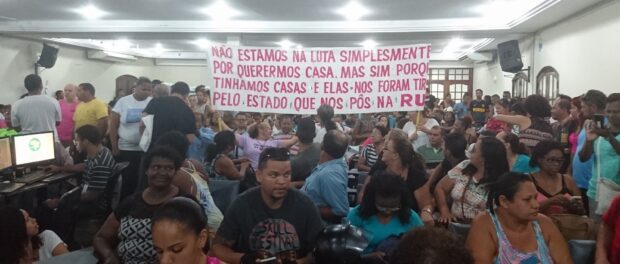
On August 31, the Rio de Janeiro Public Defenders Office held a public hearing for residents of the Complexo do Alemão, Jacarezinho, Manguinhos and Caju favelas, all in the North Zone, to voice their discontent over unfinished projects related to the Growth Acceleration Program (PAC) projects in their communities.
The hearing was organized by the Land and Housing Nucleus (NUTH) of the Public Defenders Office along with community leaders from Alemão, Jacarezinho, and Manguinhos. Among the eight panelists were officials from relevant institutions, including Caixa Economic Federal which funds projects, several State commissions dealing with public works and housing, and attorneys with the Public Defenders Office. Representatives from the Rio city government were also invited but did not attend the hearing.
Over an hour before the hearing began at 1pm, residents gathered in front of the Public Defenders Office in downtown Rio holding banners expressing their frustration with delayed improvements and forced evictions. Over 400 people attended the hearing, which was also livestreamed in an overflow room.
Having anticipated the high attendance, community leaders had organized beforehand which residents would speak. Three each from Alemão, Jacarezinho, and Manguinhos spoke, and one resident from Caju completed the panel. All the complaints from residents focused on failure to provide promised housing and insufficient social rent payments.
Camila, a resident of Alemão, spoke about being removed from her home in the Favela da Skol six years ago, and how she had still not received housing promised by the government. Her question for the panel was when she and other residents would receive housing: “We need a date, a date for the beginning of construction of our homes, each one.”
Camila also voiced dissatisfaction with the cable car, a controversial infrastructure project completed in 2011. “And they wanted the cable car for what? To go up the hill without getting tired?… We have been going up the hill for a long time without getting tired. The cable car was not our priority.”
Social rent payments, explained Márcio, a resident of Manguinhos, have been set at R$400 per month for the past six years, but rent is more expensive than that. He asked on behalf of other residents that the social rent payment be raised to R$600. Residents in the audience were visibly unsatisfied when representatives from Caixa Econômica Federal, which oversees financial transfers, spoke. Representatives said that Caixa is responsible only for financial transfers, and cannot change anything with respect to housing policies.
Other officials making up the panel were also unable to answer residents’ questions or offer complete solutions. According to Claudio Maximiano from the State Secretariat of Public Works, Minha Casa Minha Vida housing projects depend on federal approval, so state agencies represented at the hearing are unable to move forward on their own. Unfinished housing promised to former Skol residents like Camila falls under the Minha Casa Minha Vida program, a federal housing initiative meant to provide apartments for poor families and often misused in Rio to relocate families evicted from functional homes.
Despite a lack of concrete answers to residents’ questions, the hearing served to open a dialogue between residents and public officials. Two more meetings have been scheduled for September 9 with the Secretariat of Social Assistance and Human Rights to discuss social rent payments, and another on September 13 with the State Secretariat of Public Works to discuss delayed housing construction. In addition, the Public Defenders Office promised to file a request for increased social rent payments.

